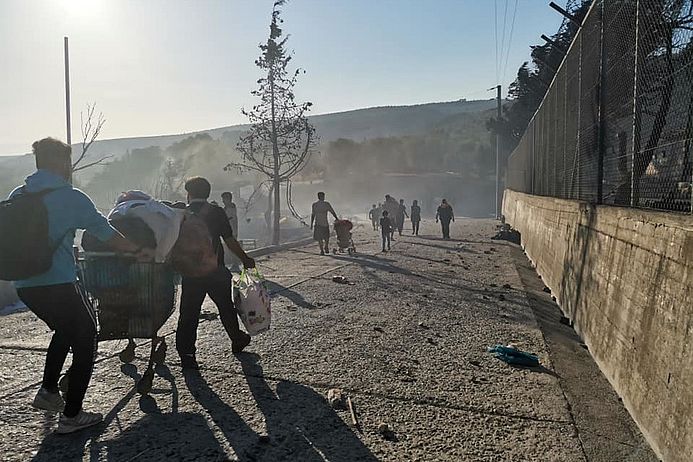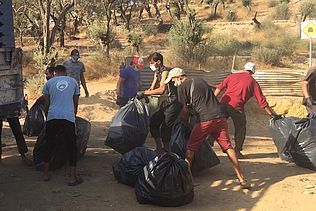20 March 2021 marks the fifth year that has passed since entry into force of the EU-Turkey deal, which was adopted two days earlier, on 18 March 2016. With this arrangement, the EU and European Member States were pursuing the aim and objective of preventing refugees from crossing the Aegean Sea. At the same time, camp complexes were built on the Greek islands, which quickly became overcrowded and where inhumane conditions prevail to this very day, often described as a humanitarian disaster. Consequently, the islands have witnessed an unprecedented humanitarian intervention by European standards, from international organisations such as the UNHCR to countless private aid organisations. But Moria and the other camps on the Greek islands are not the result of a quasi-external, unforeseen catastrophe, but rather of a policy of outsourcing that has characterised European migration control policy for 30 years now. And even after the old camp near Moria on Lesbos burnt to the ground last year, the Moria complex continues to exist.
A reception system woefully lacking in solidarity
For 30 years now, European ministries of the interior have been pursuing a single goal in migration control policy: the individual right to asylum, which is laid down inter alia in Article 18 of the EU Charter of Fundamental Rights, is to be upheld and maintained - on paper. But in de facto terms refugees are not supposed to be given access to a fully-fledged asylum procedure. The policy of externalisation itself also goes back to the origins of the Common European Asylum System. In the late 1990s and early 2000s, EU Member States negotiated European asylum rules. Conflicts arose over the so-called Dublin Regulation. It still lays down where asylum seekers in the EU must undergo their asylum procedure. Among other things, an EU Member State becomes responsible for the asylum procedure if it fails to prevent an asylum seeker from illegally entering European territory. Already during the original decision-making process regarding the Dublin Regulation, the governments of Italy and Greece vehemently criticised this reception system so woefully lacking in solidary, but in the end had to agree to the rules under pressure from the central European and dominant States in the EU. The advocates of a rigorous border closure - states such as France, Great Britain and Germany - prevailed.
Since then, the external border States have been trying to pass on the responsibility for taking in refugees, which Central Europe has placed solely on them, to non-European third countries through bilateral agreements. For Greece, the policy of externalisation has had massive repercussions. Because the border agreements in the Mediterranean, e.g. between Italy and Libya, worked temporarily, towards the end of the 2000s the flight routes of refugees increasingly shifted to Greece, traditionally a country of emigration that had neither asylum laws nor a functioning reception system. Upon arrival, refugees were sometimes arbitrarily detained and subjected to inhumane reception conditions. Already at that time, the focus was on the island of Lesbos.. In the Pagani camp on Lesbos, there were particularly serious incidents of inhumane treatment, including towards underage refugees. The Greek government closed the camp at the end of 2009 after a hunger strike by refugees and increased public pressure. In the following years, Greece continued to be a major country of arrival for refugees fleeing to Europe, without there being any significant improvement in reception conditions. The Greek government increasingly responded to arrivals with repression in the form of brutal push-backs, initially mainly in the Evros region. In 2011, the European Court of Human Rights and later also the European Court of Justice judged returns of asylum-seekers to Greece under the Dublin Regulation to be contrary to European and international law.
Tens of thousands every week
The suppression of the uprisings known in the West as the "Arab Spring", escalation in regions torn by war and crisis, and the international community's reduction of funding for the material provisioning of refugee camps in neighbouring regions, caused an unprecedented surge in the movement of refugees to Europe from 2014/15 onwards. Tens of thousands of people fled to the Greek islands in the Aegean Sea via Turkey every week. The Greek government under the left-wing Syriza party briefly stopped the push-back operations of previous governments. In this way, even more people managed to reach the islands and flee from there on to Central Europe.
The fact that camps for the detention and imprisonment of protection-seekers have been established on the Greek islands since 2016 is part of a decades-long policy of outsourcing migration controls, in which Greece has always had to serve as a proxy for the interests of the central European Member States. Bilateral agreements, hotspots and detention centres, such as those installed on Chios, Kos, Lesvos and Samos at the insistence of the EU, were not fundamentally new instruments of migration control policy. And yet the camp and deprivation-of-rights system inherent in the "Moria complex" has taken on a new quality.
Registration centres become prisons
The EU and Member States reacted to the refugee movements of 2015 by trying to repeat the obviously failed policy of externalisation. Donald Tusk, president of the European Council at the time, said the "days of irregular immigration" were over. An agreement was found with Turkey, the main transit country, to repatriate refugees to Turkey in exchange for accepting only Syrian refugees in the EU under a 1:1 mechanism. The "EU-Turkey deal" and the European hotspot approach turned the Greek registration centres on the islands into prisons.
Camps such as those that subsequently emerged on the Greek islands already existed (and still exist) in similar form in non-European third countries such as Mauritania or Tunisia. So far, the EU had managed to keep them away from European territory. In their neo-colonial ignorance, the European public took little interest in the geographically distant camps. The hotspot approach was an attempt, especially by the central European states, to deal with the problem that the policy of externalisation had obviously not proved effective and stable. Instead of barracking refugees in camps in third countries, they were now to be stopped at Europe's external borders. However, it makes a difference whether such a camp exists in the Global South or in Europe, with an established European refugee law and corresponding reception standards and procedural rights. That is why the hotspots on the Greek islands are treated by politicians precisely not like camps on European territory, but like camps outside the EU. If the EU were truly guided by the human rights it has enshrined for itself, it would not be allowed to maintain or tolerate such a camp system.
Actually, refugees and asylum-seekers have a whole package of rights under the Geneva Refugee Convention and the EU Reception Directive which sharply contrast with conditions on the islands and in the camps. The problem is: it is scarcely possible to enforce these in court. For rights to be effective, they have to be asserted; and for this to happen, resources and access to legal procedures are needed. However, the Greek authorities have shown themselves adept at preventing proceedings of fundamental importance before the courts at an early stage and blocking the implementation of successful claims. In January 2021, the European Court of Human Rights actually admitted a case brought by eight refugees from camps on four islands and sent questions to the Greek government. While this constitutes an interim legal success, it still does not make it possible to hold the EU itself responsible for conditions on the islands - Greece would once again be punished as a proxy. And even if the European Court of Human Rights were to rule on the conditions in the camps, a decision could probably not be expected for another three years. The ruling would then relate to a situation that no longer exists, denouncing conditions in camps that no longer exist.
The actual loss of control
Five years after the "EU-Turkey deal" and the introduction of the hotspots, it can be stated that the policy of externalisation has led to a vacuum of responsibility on the Greek islands and a systematic shirking of responsibility by political actors. These responsibilities need to be clearly stated: The responsibility of the EU, which has enforced the hotspot approach on the islands and is directly active there with the European Asylum Agency and Frontex; the responsibility of the German federal government and other central European Member States, which have vigorously pushed the "EU-Turkey deal" and are blocking legal routes for refugees from the islands; the responsibility of the Greek government, which runs the camp as the responsible party and is doing nothing to change the inhumane conditions there; and, finally, the responsibility of some private aid organisations, which support the camp system through a questionable engagement instead of criticising it and working to overcome it.
Ultimately, one does not even have to use a human rights-based argumentation to conclude that the camp system and the deal have never worked. Even from the perspective of actors with an interest in order, control and good governance, the "EU-Turkey deal" and the EU hotspots are a colossal failure. While the "summer of migration" is equated with an alleged loss of control across all political parties, and the phrase "2015 must not repeat itself" has become a central political mantra, the policy of externalisation, with its devastating consequences on the Greek islands, represents an actual loss of control. The narrative that the conditions on Moria are a "humanitarian disaster" obscures the fact that the "Moria complex" is the result of political decisions and calculations, and thwarts any possibility of moving the rights of refugees to the centre of the debate.
The text contains excerpts from the study "The Moria Complex: Irresponsibility, incompetence and disenfranchisement five years after the eu-turkey accord and launch of the hotspot system", which the author conducted on behalf of medico.



